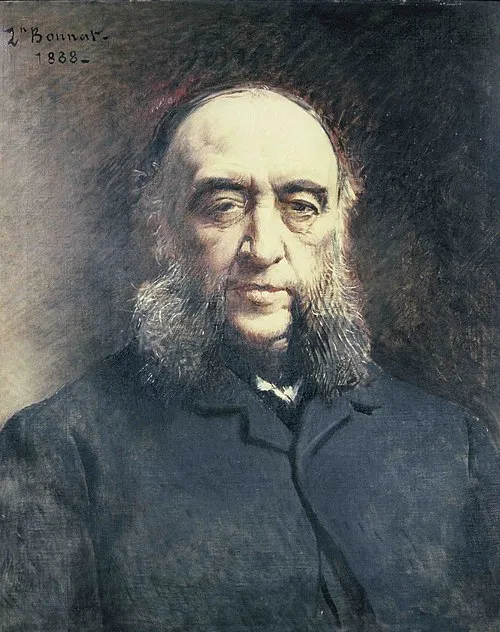
Full Name: Jules Ferry
Birth Year: 1832
Death Year: 1893
Nationality: French
Profession: Lawyer and Politician
Political Position: 44th Prime Minister of France
1832 – Jules Ferry, French lawyer and politician, 44th Prime Minister of France (d. 1893)
In the heart of the 19th century, France was a nation teetering between revolution and reform. Amidst the chaos, a figure emerged whose influence would shape the course of French politics and education for generations to come. Jules Ferry, born in 1832 in Saint-Dié-des-Vosges, found himself navigating this turbulent landscape not merely as a bystander but as an architect of change.
Perhaps it was his upbringing that set him on this path. Coming from a family deeply entrenched in law and academia, young Jules was exposed to the ideals of Enlightenment thinkers at an early age. His father was a lawyer a role model who likely ignited his passion for justice and public service. After studying law himself, Ferry began his career with vigor; he became involved in local politics as a deputy mayor in 1860. This experience proved pivotal however, it was only the beginning.
By aligning himself with progressive factions during the political upheaval of France’s Second Empire under Napoleon III, Ferry cemented his reputation as a forward-thinking politician. The winds of change blew strongly through Paris after the fall of Napoleon III in 1870 the Franco-Prussian War had devastated France’s morale and territorial integrity yet ironically opened doors for new political ideologies to flourish.
As France emerged from war's shadow into what would be known as The Third Republic, Ferry took on greater responsibilities. In 1879 he ascended to become Prime Minister a title he would hold twice throughout his career but it wasn't merely titles that defined him; it was action!
Historians recount that one of his most enduring legacies lay not within military or diplomatic feats but within education reform. Under his leadership from 1880 onward, he championed free compulsory education for children up to age thirteen. This initiative was revolutionary! At a time when educational opportunities were limited primarily to affluent families, Ferry's policies aimed at leveling the playing field arguably empowering future generations through knowledge.
Despite this noble cause, however his reforms were met with fierce opposition from various quarters: religious factions saw state control over education as an attack on their influence; conservatives feared undermining traditional values! Yet Ferry persisted passionately he believed education could serve as both social glue and vehicle for national unity.
It wasn't just about reading or writing; Ferry envisioned an educated populace capable of critical thinking a generation ready to embrace modernity rather than cling blindly to past traditions! Perhaps one can imagine how different France might have been if those ideals hadn’t taken root during such transformative years?
The irony remains that while Jules Ferry fought ardently against clerical interference in public schools which resulted ultimately in legislation separating church from state it also sparked fervent debates surrounding secularism still alive today across Europe... It’s almost poetic how these struggles echo into our contemporary society where discussions around religious freedoms versus secular governance continue unabated!
As time went by and political tides shifted again towards nationalism with colonial pursuits dominating French foreign policy Ferry found himself entangled further amidst controversies stemming from imperial ambitions: He advocated expansionist policies aimed at securing overseas territories like Indochina! Who knows what drove him here? Was it ambition? National pride? Or perhaps genuine belief that these endeavors could uplift civilizations?
This chapter marked another shift a dual legacy entwined with progressivism domestically yet imperialism internationally... It left many wondering about contradictions inherent within human aspirations: striving for enlightenment while simultaneously seeking dominion over others?
The landscape changed considerably after his tenure ended following scandals related to colonial affairs and although he remained influential till death came calling in 1893 it is indeed ironic how history has shaped perceptions regarding such figures who once held power! Was Jules Ferry celebrated merely because he paved pathways towards modern France or criticized due lingering shadows cast upon ethics behind imperialistic actions?
Evidently though as we look back today we find ourselves reflecting upon contradictions knitted into fabric woven throughout history itself... On occasions when we raise questions surrounding authority versus accountability concerning leaders past present or future one cannot help but ponder whether we truly learn anything from these legacies...
The impact left by Jules Ferry echoes long after his passing a legacy interwoven not only into educational systems across nations but also intertwining threads representing moral complexities still confronting societies worldwide today...
Early Life and Education
Jules Ferry was born in Saint-Dié-des-Vosges, a small town in eastern France. He pursued his higher education in law, graduating as a lawyer. His legal expertise would later influence his political career, especially concerning legislation related to education and civil rights.
Political Career and Policies
After being elected to the National Assembly in 1871, Ferry quickly emerged as a key player in French politics. His advocacy for universal, free, and secular education led to the landmark laws known as the “Ferry Laws” of 1881-1882. These legislations established primary education as compulsory and secular, which was a radical shift for a nation where the Catholic Church held significant influence over schools.
His policies promoted the establishment of schools across France, significantly increasing literacy rates among the populace. Ferry believed that education was the cornerstone of republican values, crucial for nurturing responsible citizens and preventing the rise of extremism.
Controversies and Challenges
Despite his monumental contributions, Ferry faced considerable opposition during his career. His support for colonial expansion, particularly in Tunisia and Indochina, sparked debate and dissent within France. Critics accused him of prioritizing imperial interests over domestic welfare. Nonetheless, his resolute vision for education remained largely unchallenged.
Legacy
Jules Ferry passed away on March 17, 1893, but his impact on French society continues to resonate. The educational reforms he championed laid the groundwork for the modern educational system in France, creating a model that many countries around the world have emulated. Today, Ferry is remembered not only as a statesman but as a defender of children's rights to an education free from dogma.




